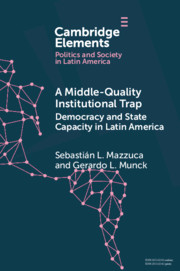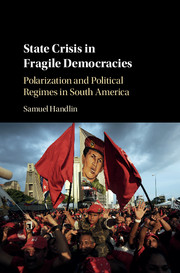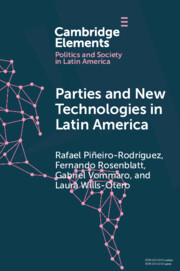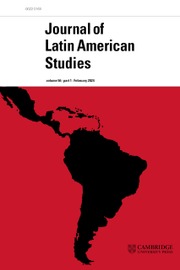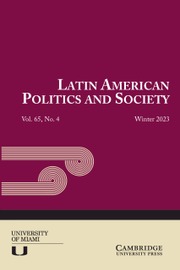The Birth of Democracy in South America
South America contains some of the oldest democracies in the world, yet we still know relatively little about how and why democracy arose in the region. Raúl L. Madrid argues that three main developments – the professionalization of the military, the growth of parties, and splits within the ruling party – led to democratization in the early twentieth century. Military professionalization increased the incentives for the opposition to abandon the armed struggle and focus on the electoral path to power. The growth of parties boosted the capacity of the opposition to enact and enforce democratic reforms that would level the electoral playing field. And ruling party splits created the opportunity for the opposition and ruling party dissidents to ally and push through reforms. This persuasive and original book offers important implications for the study of democracy. This title is also available as Open Access on Cambridge Core.
- Drawing on original data from every presidential election and revolt in South America before 1930, this book offers a fresh perspective on the origins of democracy in the region
- Provides a persuasive account of political outcomes in all ten South American countries, explaining why some democratized before 1930 while others did not
- Clear and concise presentation of data in figures and tables makes the key data and principal arguments quick and easy to understand
- This title is also available as Open Access on Cambridge Core
Reviews & endorsements
‘Raúl L. Madrid's The Birth of Democracy in South America is a superb book. It is one of the best books I've read on Latin America, and it is the best comparative analysis I've read of the origins of democracy. The book offers a clear, very original, and parsimonious theoretical argument; engagement with the existing literature; outstanding empirical research; a highly important research topic; excellent knowledge of the cases; and a very disciplined approach to the case studies.' Scott Mainwaring, University of Notre Dame
‘This book offers highly innovative and empirically very well supported theoretical arguments explaining the emergence of (proto)democratic regimes in Latin America. Combining impressive data collection with compelling comparative historical analysis, Raúl L. Madrid demonstrates the impact of military professionalization, strong opposition parties, and splits in the ruling party on chances for early democratization. A must-read for all those interested in democratization and Latin America.' Evelyne Huber, University of North Carolina, Chapel Hill
'At last! Raúl L. Madrid delivers the foundational book on the first epoch of democracy and authoritarianism in South America. With clarity, originality, and rigor, he shows how professional militaries and strong opposition parties led a few select countries to early democratization. This outstanding work represents what is best about comparative-historical analysis and is an essential touchstone not only for Latin Americanists, but for any scholar who works on regime change.' James Mahoney, Northwestern University
Product details
August 2025Hardback
9781009633819
390 pages
229 × 152 mm
Not yet published - available from July 2025
Table of Contents
- Introduction: the origins of democracy in South America
- 1. Armies, parties, and the birth of democracy
- 2. Elections and democracy in South America before 1930
- 3. Military professionalization and the decline of revolts
- 4. The origins of strong parties in South America
- 5. The roots of strong democracies: Chile and Uruguay
- 6. The roots of weak democracies: Argentina and Colombia
- 7. The roots of stable autocracies: Brazil, Peru, and Venezuela
- 8. The roots of unstable autocracies: Bolivia, Ecuador, and Paraguay
- Conclusion: contributions and implications.


